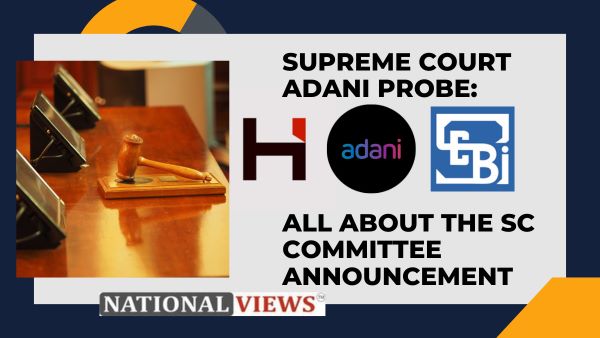In a recent development concerning the Adani-Hindenburg controversy, the Expert Committee headed by Justice AM Sapre along with retired Justice JP Devadhar, Mr. OP Bhat (former Chairman of SBI), Mr. Nandan Nilakeni, Mr. KV Kamath, and Mr. Somasekharan Sundaresan appointed by the Supreme Court has made an important announcement in Adani Probe.
Adani Probe: The Announcement by Supreme Court Expert Committee
The committee, at present, is unable to determine whether the handling of the alleged securities law contravention by the Adani Group or other companies by SEBI amounts to “regulatory failure.”
The committee’s primary objective is to assess the situation thoroughly and provide recommendations that promote investor awareness, strengthen the statutory framework, and ensure compliance with existing regulations.
Supreme Court Adani Probe: The Key Points
The Sapre Committee, entrusted with the investigation, is focusing on three specific areas of concern –
Firstly, whether there has been a violation of Rule 19A of the Securities Contracts (Regulation) Rules, 1957, which mandates a minimum public shareholding of 25%.
Secondly, whether SEBI has received all the relevant information regarding transactions with related parties, as required by law.
And thirdly, whether the manipulation of stock prices has resulted in a violation of existing laws.
The committee’s assessment of the Rule 19A violation depends on the compliance of the 13 overseas entities, including 12 foreign portfolio investors, with the disclosure of their beneficial owners, as mandated by law.
SEBI has stated that currently, there is no evidence suggesting that the individuals listed as “beneficial owners” are not genuine, which is crucial for identifying the “ultimate beneficial owners” and enforcing the necessary regulations.
According to the expert committee, SEBI has not presented a compelling case based on prima facie evidence. However, further investigation is required to confirm this stance, especially considering the publication of the Hindenburg Report, which has raised suspicions. Consequently, SEBI is seeking additional time to conduct a more thorough investigation.
The committee underscores the significance of an effective and consistent enforcement policy that aligns with legislative policies, ensuring that regulatory resources are not squandered on retrospective actions. SEBI has an active surveillance framework in place and has examined potential market abuse alerts related to Adani stocks, finding no evidence of artificial trading.
Although certain entities did profit from short positions following the report’s publication, the committee, based on SEBI’s explanations and empirical data, cannot definitively conclude that there has been a regulatory failure concerning the allegation of price manipulation.
SC Bench on SEBI Investigation
Earlier, a bench comprising Chief Justice DY Chandrachud, Justice PS Narasimha, and Justice JB Pardiwala addressed the issue of SEBI’s investigation timeline. Upon hearing an application for a six-month extension, the bench clarified that it could only grant SEBI a maximum of three months to complete the investigation.
Initially, the top court had allowed a period of two months as per its order from March 2, which concluded on May 2, coinciding with the final hearing of the case.
SEBI, in response, submitted an affidavit to the Supreme Court, supporting its request for additional time. The affidavit outlined the complexities of the transactions involved and justified the need for a more extensive evaluation.
The petitioner claimed that the Securities Board had been examining Adani since 2016. However, SEBI has refuted this claim, stating that the investigation focused on the issuance of Global Depository Receipts by 51 Indian listed firms, none of which were associated with the Adani Group, as per some reports.
The court proceedings are ongoing, and further updates regarding the investigation will likely be revealed in due course. The Supreme Court has granted SEBI an extended deadline until August 14, 2023, to conclude its investigation into allegations of stock price manipulation made against Adani Group companies by the US-based short-selling firm, Hindenburg.
Meanwhile,
Also Read: Adani Shares Rebound: Know How it Can Trouble Retail Investors?


